
Sleep literally controls your eczema.
Many factors affect how bad your flare-ups can get but…
Did you know that sleep is the most important factor that determines whether you can REALLY heal your eczema, or not?
Studies show that people with eczema typically lose about 8 years of sleep in their lifespan.
Here, you’ll learn almost EVERYTHING about sleep and how you can conquer it, so you can have a real recovery.
Plus a bonus at the end.
How Painful Can Sleeplessness Get?
Sleep deprivation is an effective torturing technique, Russia used it on the Prime Minister of Israel Menachem Begin when he was a NKVD prisoner.
This man was kept awake for a few days and when he was allowed to sleep, he was awoken again and questioned, let’s hear his thoughts:
“
In the head of the interrogated prisoner, a haze begins to form. His spirit is wearied to death, his legs are unsteady, and he has one sole desire: to sleep… Anyone who has experienced this desire knows that not even hunger and thirst are comparable with it.” – Menachem Begin
Sleep Deprivation Experiment On Rats
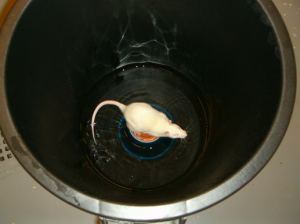
There’s a study on rats when they were sleep deprived for 32 days, all of them died.
Here’s the research.
The scientists came up with 3 main possible conclusions:
- Their body temperature dropped too low and got hypothermia.
- Their immune system weakened so much that their gut bacteria infested into other parts of their body.
- Stress levels combined with brain damage resulted in death.
Fortunately, there haven’t been any significant studies for human beings, who would like to volunteer…?
Actually, human beings are smarter because our body forces us to sleep if we ever happen to be extremely sleep-deprived, it’s consciously uncontrollable.
Ellen Marmur (MD, Dermatology) Tells You The Truth
The nervous system has two states in balance: the sympathetic system and the parasympathetic system (when you sleep).
“The sympathetic system, which is more in control while we’re awake, keeps the blood flow near the core of the body. While we sleep, the parasympathetic nervous system runs the show and blood flow shifts to the skin.”
But when asleep:
Additionally, skin isn’t under attack from the sun and the elements at night. This relaxed parasympathetic state allows greater circulation and oxygen flow to the skin, or peripheral vasodilation in medical terms. This is when the skin gets a lot of internal attention and repair mechanisms go into action, much like the night workmen at Disneyland who fix and restore the rides and clean the place up before the park opens the next day. Receptors spring to life within the blood vessels and grab amino acid molecules (the building blocks) to help build more collagen, and fluid and toxins are drained.”
What about the dark puffiness under the eyes? Here’s the explanation:
“Without enough rest, the skin doesn’t get this repair and restoration, and all that important activity isn’t being done. One example: when excess fluid near the skin isn’t transported to the bladder to be excreted, the result is puffiness. (The kidneys work more actively during the parasympathetic state to convey excess fluid from the circulatory system to the bladder). It shows up most around the eyes because there’s less fat in that area, so water retention is more apparent. As far as dark circles go, a lack of sleep doesn’t cause them (they have more to do with your anatomy, but accentuates them because your skin appears dull and translucent (due to that lack of blood flow to the skin).”
(Source)
You see, sleep deprivation doesn’t directly cause its symptoms, sleep deprivation causes damages to your inner body WHICH RESULTS in symptoms.
It’s important to understand the cause and effect process, just as it is to understand itchy skin isn’t the cause of eczema, a damaged and toxic body is what really leads to these symptoms.
Eczema is a term classified for its symptoms NOT its cause.
Effects of Sleep Deprivation
Typical issues that everyone face (image credit):
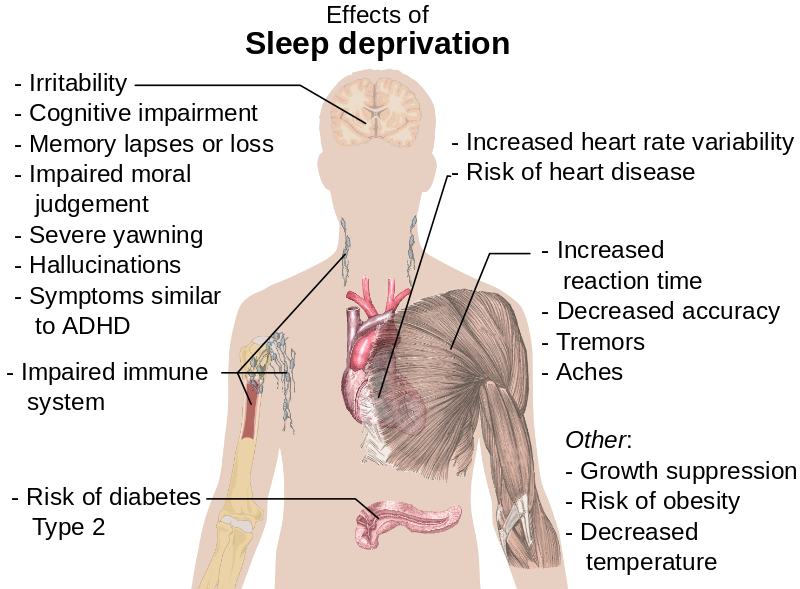
Now, here’s how a lack of sleep can affect your skin:
- Abnormal stress levels induced by sleep deprivation will lead to increased inflammatory responses, this includes: itchy skin, wrinkles, acne and various skin problems.
- Sleep deprivation reduces the ability of the skin barrier (stratum corneum) to hydrate itself and to produce a protein, collagen (research), that helps lock in the moisture from evaporation.
- Poor function of the skin’s acid mantle, a protective barrier that is designed to ward off infections.
Signs of You Being Sleep-Deprived
- Can’t cope with stress levels.
- You have moody tempers.
- Poor memory.
- Cannot concentrate.
- You feel like eating more.
- Vision problems.
- Bad decision-making.
The most obvious clue: you feel like dozing off during daytime.
I returned all my sleep debts once and I stopped needing an alarm to wake myself up, I woke up automatically after around 8.5 hours every day.
Daily Sleeping Requirements
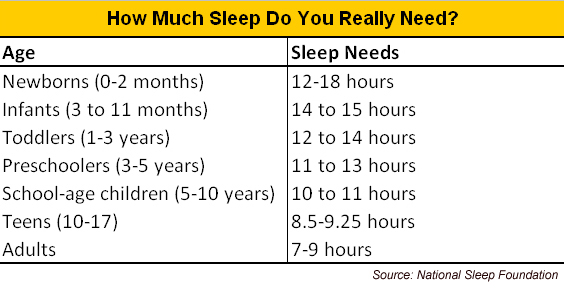
Although sleeping requirements for individuals may vary, only a rare percentage of the population has special genes that allow them to function with less daily sleep.
Understanding How Sleep Actually Works
Sleep is classified by two types: NREM (non rapid eye movement) and REM (rapid eye movement). Here’s a better description:
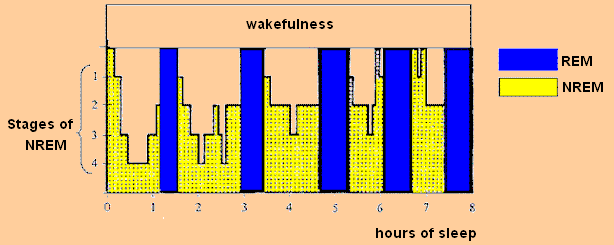
REM Sleep:
REM sleep is the time where we dream and are in the deepest stage of unconsciousness, this is the actual time where your brain gets its energy back.
REM sleep takes a total of only around 120 minutes split into multiple sessions of approximately 20 minute sessions.
NREM Sleep:
NREM takes up the majority of your sleep, it’s a gradual transition from light sleep to deep sleep and finally into REM sleep, then this cycle (approximately 90 minutes) restarts.
NREM sleep is the period of time where your body goes through all kinds of biological functions and maintenance. There are actually 4 stages of NREM sleep, and the last 2 stages of NREM sleep is the period of time where your skin gets treated and maintained.
If you want to promote healing for eczema, you need enough stage 3 and 4 of shut-eye every night.
It’s the time when your body secretes growth hormones and repairs body tissues, including skin cell production.
(More information on the stages of sleep)
The Biological Clock Inside Us
Our body has an inner clock based on the 24 hour schedule, this is how it works:
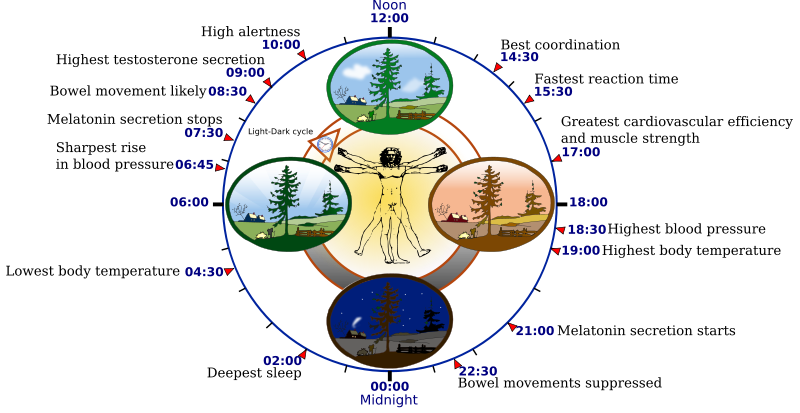
(Source)
It’s called the circadian rhythm.
Your inner body clock gets naturally adjusted by sunshine, so you should be sleeping when it’s dark and waking up along with the sunlight.
How To Deal With Sleep With Eczema
If itches ever happen at night, you can’t control them because you were unconscious. Here are several tips to make the best of it:
Dust mites: did you know that millions of tiny little bugs are on your bedding, pillow, skin and clothes feeding off your dead skin cells right now? People can be sensitive to the protein found in their excrement, learn more about these tiny bugs.
Air pollutants: install an air cleaner or purifier to get rid of all the harmful allergens and bacteria in the air.
Humidity: use either a humidifier or dehumidifier in your room if the humidity levels in your place get too extreme.
Temperature: depending on the size of your room, make sure your room is cool enough for you at around twenty-something degrees, because heat is an itch trigger.
Topical treatments: apart from the regular moisturizing routine, you could also apply an anti-itch herbal skin paste before dozing off, this helps reduce your likeliness to scratch at night. Learn how to make your own herbal skin pastes for eczema.
Light clothing: make sure you are not wearing anything artificial, tight or restrictive that will prevent your skin from breathing; blocking the pores will irritate the skin tissues and cause itches.
Safe scratch clothing: there are items that can prevent you from causing damage due to scratching at night, for example: long sleeved clothing, gloves and the popular Scratch Me Not (infants only).
Practical Advice on Better Sleep
My personal tip is to maintain the same sleeping pattern everyday and if I ever accumulate sleep debts during weekdays, my goal on that day is to find time to take my recovery nap as soon as I can (for at least 90 minutes so I can actually get those REM sleep, remember?).
Naps are useless if you never get to REM, so stop taking those 30 minute naps.
This is to avoid piling everything up for the weekend to sleep in, so you don’t mess up your inner body clock.
Dietary Factors:
- Don’t eat right before you sleep.
- No foods high in spiciness, sugar and fat.
- Avoid acidifying foods such as corn, Coke, vinegar; refer to the acid-alkaline food charts.
- Avoid foods high in natural chemicals such as MSG, refer to the natural chemicals potency tables.
- No substances that affect sleep: caffeine, alcohol, nicotine and all kinds of sleep-related drugs.
- Cut down your omega-6 intake and raise omega-3 (check out problems with today’s diets), omega-3 promotes sleep, too.
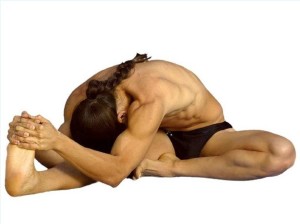 Other Factors:
Other Factors:
- Do some stretches right before sleep, I personally do a routine of 4 sets of leg stretches every night before I go to bed.
- Try reading a physical book before sleep, it induces sleepiness.
- Exercise a few hours before you go to sleep, but not right before it.
- Don’t nap too much during the day, just sleep early at night.
- Don’t use too much brain power, don’t think of complicated things or trying to solve a problem before you sleep. Nighttime is for simplicity.
Natural Foods That Promote Sleep
- Bananas
- Chamomile tea
- Warm milk
- Honey
- Potatoes
- Oatmeal
- Almonds
- Flaxseeds
- Turkey
That’s because these foods contain sleep-promoting nutrients including: tryptophan, magnesium, Vitamin B6 and B12.
BONUS: How To Wake Up Without Extreme Tiredness
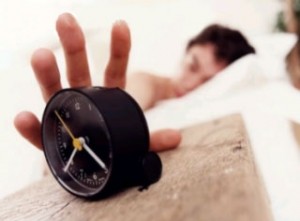
Here’s a trick to help you wake up with an extreme reduction in sleepiness, it’s more of a brain hack.
We need REM sleep to really get those energy recharges. The problem is, when we have messed up sleeping times, sometimes we wake up during deep sleep.
Waking up in REM causes extreme tiredness, because you’re suddenly getting disturbed from strong unconsciousness.
The trick is to deliberately time yourself to wake up during NREM (light sleep).
How?
We know that a sleep cycle takes about 90 minutes and then another cycle begins again starting at stage 1 NREM – the amount of repetitions depend on your age. Rather than setting an alarm clock at a specific time such as 7am in the morning, use a countdown timer for ONLY multiples of 90 minutes.
For example: I’d ONLY wake up after sleeping for 90 minutes, 180 minutes, 270, 360, 450 and so on.
Use a countdown, not an alarm.
Extra Sleep Resources
Sleepdex – a website with information all about sleep.
How Much Sleep Do You Need? – this article has some good information on sleep cycles and needs.
How To Sleep Better Tips – some nice tips to help your sleep.
Vitamins and Supplements – here are nutrients to take to promote sleep.
To Eczema Sufferers
Sleep is a critical trigger to eczema symptoms, and if you’re aiming for the fastest recovery possible, make sure you have enough hours.
Most people don’t have sleep disorders; we just have a busy life that gets us sleep deprived, not to exclude internet use and TV use.
Let’s simplify: get your required hours every night, and your body will do its job best to promote skin healing.
Hello, i just wanted to thank you for your postings!
I have suffered from eczema since a baby up until now when I am 25 years old. I recently quit using all my topical corticosteroids and have adapted to a natural lifestyle. It has not been easy. My eczema has never been worse and painful but I understand it is part of the detox process. I use sunflower oil to moisturize my skin. I have such trouble sleeping because of my skin pain and dryness. I probably get 3 hours of sleep if I am lucky. I am so desperate now and feeling awful. Do you have any insight or did you face similar difficulties? Again, thank you so much and God bless you!
Hey Lynn, nice to hear to that you have switched to a natural lifestyle, and it certainly IS hard. I definitely remember how it was painful to even just move or stretch when under the detox process, like for example the skin on my back when I stretched would rip literally I can feel rip. Hot showers were the only thing that brought relief but NEVER do it, because you’ll come out even more painful. I haven’t used sunflower oil before but it would certainly help. Right now, I would suggest you to try an oatmeal bath – it’s really soothing. And also to speed up your detox process – sweat a lot doing exercises. You’re welcome, God bless you too!
Hello, I would recommend coconut oil 100% raw – it has many advantages and specially for people with eczema. I use it now and it smell good and it really helps to kill bad bacteria on your skin and in your head.
Martin
Hey Lynn,
I am in exactly the same situation and have been looking for the same answers. Richt now I am eating healthy greases to moisturize from the inside such as avocado, nuts, seeds, oils, fish, eggs and fish eggs and it helps. Drink a lot of water! I use apple vinegar for cleaning my skin which also helps reduce itching a little and almond oil for moisturising. A bath with rice powder (starch) helps for itching before you go to bed. Next to that I take supplements of oils and minerals, prescribed by a docter that is schooled in classic (western) medicine and also in Eastern medicine. I personally do not believe in a homeopathic approach, so I found many answers with this docter. Hopefully you can find Someone alike where you live.
Next step I want to take is learning how to deal with stress, because in my current stage I react explosively to the smallest stress which makers me ill for a week and that is no way to live. All the best and don’t give up!
Hey Harrison, I’ve used cortisone all my life for my eczema and now I have it from head to toe, about a week ago I decided to finally stop using cortisone and I went to a natropath and I’m on some medication to help my immune system and skin. all my eczema has come out on my face/ neck really bad and it is so uncomfortable, I feel terrible and depressed, mainly from the discomfort so I have stayed hkme for the last week or so just waiting to get a bit better. I can’t sleep at night because I’m so itchy and uncomfortable, I have been having baths with alpha kerri oil.. But not too sure what to moisturise with. It’s hard to see a way out of this pain and I feel so alone, especially being a young girl, I envy every girl I see that has glowing skin, they don’t realise how lucky they are. could you give some advice to me please 🙁
Hi Sarah,
Don’t worry, your skin will become smooth and clear after this process. Don’t give up! As you might know, you’re in the healing crisis where the symptoms excerbate. When I was like you, I “moisturized” with vaseline petroleum jelly. I put in quotes because it doesn’t actually moisturize but apply a layer of jelly to cover up the natural moisture we have. It’s best way to cover up dry skin. But you can also apply actual moisturizers as long as the ingredients are pure and natural commonly based on: shea butter, coconut oil, aloe vera, chickweed.
Also, at this stage, since you’ll get really dry skin, you don’t actually have to shower every day. There is no fixed rule regarding to how often a person should shower, you should adjust it to your own health (since your natural skin oils will be limited).
You could also speed up your recovery by eating foods that boost recovery (following the restricted diet) and treat the trio well: stress less, sleep more and exercise more. All of these will boost detoxification and speed up the painful process.
I’m interested though, what medication did the naturopath give you?
Let me know if you ever have any questions. 🙂 And don’t give up!
Cheers,
Harrison
Hi this is such a good article!! I have recently had an outbreak of eczema and after a few very sleep deprived weeks, even though I cut down drastically on the scratching, detoxed, and applied natural moisturisers, it became so severely inflamed that I have resorted to using a tiny (pea sized or less) amount of 1% hydrocortisone on my legs and arms along with natural moisturisers. it is helping but I am worried that my itching has gotten worse and the recovery won’t be sustained. Have you got any tips? I don’t get eczema anymore generally, and certainly don’t use steroids, but I’m thinking if I reduce the amount of hydrocortisone I use daily (on day 4 now) and work harder to relax/ catch up on sleep it will healh itself?
Kiara. Sorry for the delay, as I have just been recently been back on track on CES after exams. How is your progress now?
Hi Sarah
I know what you are going through I went through it for two years, I was using an ointment which had cortisone in it, when I stopped using it I broke out everywhere on my body and nothing seemed to help every time I’d go to the doctor their first suggestion was cortisone it got so bad that my liver was not functioning properly. I finally decided to get rid of all the cortisone in my house so that I wasn’t tempted to take any when it was really bad.
A few months later someone suggested a treatment called phototherapy, I was desperate at the time and willing to try anything. I am proud to say that I have been cortisone free for over a year and the only creams I use have menthol in it, I do have breakouts every now and then but it’s not as bad as it was. I still carry on with the treatment because it works for me and maybe it will work for you.
nationaleczema.org/eczema/treatment/phototherapy/
Mia☺
I recently started taking 90 minute naps in the afternoon. It was amazing, within a couple days the eczema on my hands started to clear up. It appears that supplemental sleep was the extra boost of sleep I needed. I sleep a lot so getting the rest I need is challenging, and napping seems to be my solution. I wouldn’t be surprised if a lot of eczema sufferers are long sleepers like me.
Corey. I’m glad to hear your great news. Thanks for sharing. But if the flareups seem to come back, despite your boosted sleep, then you know when to be a little more conscious of your dietary choices. Harrison
I suffer from eczema fro head to toe for one year after having not had it in 30+ years. When you have it as bad as I, no western or eastern approach will work, I have a condition called leaky gut, caused by year’s of eating like royalty. There is a solution, but you won’t hear this from a western medicine practicing dr.
You must check in to True North in Santa Rosa, CA and go through their doctor assisted 20 to 30 day distilled water cleanse. After your eczema completely leaves, they put you through a 12 day re-feeding where you learn what foods that will cause an outbreak. It is thought that leaky gut can lead to cancer, sio I believe you must treat severe atopic dermatitis as a life and death situation. People leave True North & their eczema & psoriasis as well as arthritis & type II diabetes never return.
Doug.
Thanks for sharing about the True North center. I’ve seen similar institutions but they are not that easy to find. I would really love to experience once. Glad to know that you found it effective.
But I want to clarify I don’t try to lean my method on a “western” or “eastern” approach. I simply believe in the natural approach. If it’s something I can’t find in nature, I don’t get involved with it. Additionally, the water fasting part of the program is important, just as I have personally attempted in my 3 day water fast. And I agree, it feels great afterwards.
Wish you the best of luck in all. And thanks for sharing!
Cheers,
Harrison
Living with Atopic eczema since fourteen, been on oral steroids prednisolone since 2007, I quit it for my own good two weeks back,tappering off gradually and using licorice roots to support my adrenals and changing my diet to be cleaner. About staying off my workplace to face the predictable flare up I expect, it is scary, but I want to get well. I always wish someone will tell me how long this will take, I am 25now. I’m scared to tears each time I think of it, why US? why eczema? This affects just about anyone from anywhere, I am a Nigerian from Africa. Its lonely and depressing. I’m drinking spring water, eating mostly foods and veggies. But how long will the healing crisis take, I need answers from the skies.
Maryam,
I absolutely understand your situation. Eczema is surely a very unpleasant condition to face. I hated it every single day too. From how you talk, I think you recognize that steroids don’t work and you know what to do. The hard part is applying the natural approach and getting through the difficult withdrawal and detox effects. I’m sure you can get through it. As for a time, it IS very hard to give a straight answer I won’t lie. And because I had no guidance of time in 2013, I simply went for the rigid approach without almost no cheating. It took about 2 months for complete healing, where there would be no more itchy skin and itching at night (though the itches go away much earlier than the scars to heal, the discoloration also takes the longest). So to answer your question, it does depend on how rigid you go with the approach and how much rest you give your body. 2-3 months would be a nice guideline to follow.
Keep it up!
I had mild eczma made worse up to severe eczma by what i ate and drink. It took me 13 years to figure that out. My account is at http://www.angoproblemas.com/eczma.html if you allow me to post the link here, otherwise just delete it. The impact on my life was massive. It is impressive how having my hands free of eczma is the source of so much hapiness and relief.
Thanks for sharing your story Jose! Glad it’s gone!